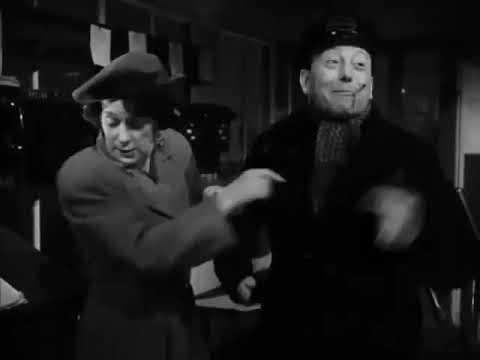From what I’ve said this week about the harbor, you might think that it’s the last place you’d look for danger. For that, you’ll more likely look to a hurricane off the coast of Florida, as in Key Largo, or the isolation of a swamp, as in Cape Fear. But there is the heart of the irony of our Film of the Week, Temptation Harbor. Bert Mallison (Robert Newton) is just an ordinary signalman perched in his croft above a British harbor. He’s a widower, and he is trying to bring up his only child, a teenage girl named Betty. Bert doesn’t make much money. He wouldn’t want it for himself, but one day he sees his daughter at work in the local butcher’s shop, bullied and harassed by the butcher’s wife, and it pains him. He tells her she’s not to work there anymore. He won’t have his daughter treated so. But he is an upright and honest man, or at least he has always been honest. As he says to Betty, early in the film, with that endearing lower-class consonant-chopping of the Cockney accent, “Now look ’ere, Betty. Don’t you start makin’ excuses for something you done wrong. That never got no one nowhere. Once you start doin’ ’at, it’s the thin end o’ the wedge, see?”
And then something happens. Everyone knows that temptations can be born of greed, or ambition, or lust, or vindictiveness. What’s harder are the temptations born of love. One night, Bert — whom we do feel for, because he doesn’t have any better boss than Betty had — is out watching the docks from above, and he sees two men, one with a suitcase, and the other running after him. The men scuffle, and in the fight, the man with the suitcase plunges into the water, fatally stabbed, while the murderer runs off. Bert scrambles down to the dock and jumps in. He can’t haul the body out, but he does find the suitcase. When he takes it up to his station and opens it, he sees that it’s full of money: five thousand pounds. He knows what the right thing to do is. He knows he should give it over to the police. And he is ready to do just that. But — temptation. If he keeps the money, it would be as if his ship had come into harbor. Of course, the murderer is still on the loose, and he’s not going to let things slip away so easily. Yet it is more than just a practical problem of concealment, this lie of Bert’s, this keeping what is not his. We’re not machines. We are human beings, made to thrive on what is good, so that what is bad will have its effect upon us inevitably, regardless of our opinions or our excuses or our rationalizations, because what is wrong is like a disease of the soul. The rest of the film then plays out this temptation that Bert has fallen to, presenting him not just with the consequences, but with one farther temptation after another, exactly as he has said to Betty in the beginning. The single bad deed is like the thin side of a wedge, and with every motion, that wedge sinks deeper.
No spoilers here! Debra and I have become admirers of Robert Newton’s craft, usually in roles as the bad man (he is Long John Silver in Walt Disney’s rollicking production of Treasure Island, with our favorite character actor Finlay Currie as Billy Bones, a regular mountain of a man singing, “Yo ho ho and a bottle of rum!”). But here Newton shows his range, and the remarkable expressiveness of his face, his hands, and his stature. He does love Betty and he wants the best for her. He is somehow a real innocent, somebody easy to take advantage of, and a slick pretty carnival lady (Simone Simon) tries to do just that. Our own feelings are torn. We wish him well, and we’re led to do so, and yet we too are pulled up short, because every time we are inclined to believe that his keeping the money is not a big deal — every time we go with our sentiments and not with what we know is right — we end up cast as strangely complicit in the wrong.
For the real tempest is within the man’s mind and heart. That’s where the battle lines are drawn, as Solzhenitsyn said: in the heart of every man. The great drama of life comes with all its force to a simple man named Bert, minding his own business on the docks, decent and unassuming, strong in body but not so strong in will. This film for us is indeed a forgotten gem.





Thank you. We watched this yesterday. Good message. Robert Newton is in a movie (I suppose he was in many) called This Happy Breed, a Noel Coward work. I am hoping you will please write about it. It’s an excellent film that many of your readers would like.